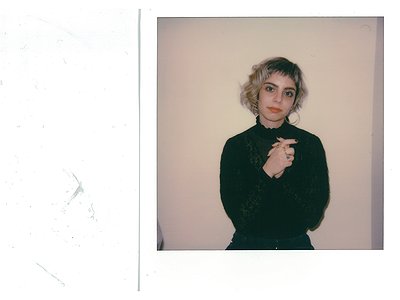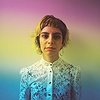Could you describe your creative process on the basis of a piece or album that's particularly dear to you, please? Where did the ideas come from, how were they transformed in your mind, what did you start with and how do you refine these beginnings into the finished work of art?
I have a hard time hanging on to a particular recorded piece. One that sticks out the most to me are some of the longer form improv tapes I have, like Squid Time Continuum—probably because I was stewing in despair when I recorded it—and natal host. Squid Time Continuum was recorded when I had just found out my cat, Squid, had stage 4 kidney disease. I was so incredibly sad and recorded two long form improv sessions (sides a and b) back to back one evening with her on my mind. I remember how my gear was set up, and kind of just thinking this was my dedicated musical gift to her. Five years later and she’s still kicking it! She’s magical. And natal host was also an interesting tape I did for Moog. They had just released the Moog Mother 32 and sent me one in exchange for a tape release using it. I spent two days learning it and recording every step of me exploring the instrument. I didn’t use any other instruments or overdubbing, just the mono synthesizer and my looper, and then picked out my favorite moments to make the album. As much as I like to go into playing music with no parameters and talk so much about that being my process, it’s kind of interesting that the two pieces I mention had more of a purpose going into them. Well, there you go, conceptual/programmatic music vs. absolute music. My constant battle. I always just want to say nothing matters.
There are many descriptions of the ideal state of mind for being creative. What is it like for you? What supports this ideal state of mind and what are distractions? Are there strategies to enter into this state more easily?
Everything and nothing can be a distraction, especially as I get older and have more responsibilities. On days when I don’t have any pressing obligations, I’m now like, “Great, can I just chill now,” whereas I used to be like, “Okay, now it’s time to make art.” I used to always prefer making music over anything else. Now I can just stare into space and be okay with that. For a while, at least. I think that’s why keeping a schedule is so important. While I could just watch TV or do absolutely nothing, when I follow a schedule I find that as soon as I reach the point in my day where I am supposed to go work on music, I sit at my synths and I am immediately like, “Oh yeah, this is the thing I love, why’d it take me so long to get started today?” And I don’t really get distracted once I get started. I luckily can shut everything out around me (unless I feel self-conscious because people around me are listening, but I get over that once I’m in the zone). I think the best advice I can give is to not really take breaks from creating, even when you’re not feeling it or think you’re having a block. It’s kind of like exercising, you know? Other artists may have rituals to get into the zone, but I’m not sure I do. I just have to play. I prefer the evening and dim lights and nice smelling candles or essential oils. I also think it’s incredibly important to make your practice easily accessible. If you have an instrument, keep it out and in sight, not in the case. Make everything easy for you to just start doing it.
How is playing live and writing music in the studio connected? What do you achieve and draw from each experience personally? How do you see the relationship between improvisation and composition in this regard?
My recorded compositions are improvisations, so they’re one and the same for me. I also mostly play live improvisational sets in front of audiences. However, in the last couple of years, I have been learning my improvised recordings. To do that, I listen back and transcribe my songs from my releases, and try to figure out how to recreate them again. I think the differences to point out between improv, compositions, and live performances is the audience aspect, and how I’m affected by my performance anxiety. It sometimes gets in the way. I try to trick myself into thinking no one is there when I get on stage, so it can feel the same as when I’m at home. It’s hard, but I can sometimes get there. I also recently finished the score to a documentary, and that was more of a multitrack recording/editing project. It was a challenge to get my improv brain to slow down and be more minimal for the typical studio music project with pauses between each layer before the next take or part. Overthinking is a huge detriment to my music making.
How do you see the relationship between the 'sound' aspects of music and the 'composition' aspects? How do you work with sound and timbre to meet certain production ideas and in which way can certain sounds already take on compositional qualities?
Sound/timbre is what mainly influences my compositions. If I start with a high frequency sound, I think of ways to balance that. I try to think full spectrum so every part has its tonal place in a piece.
Our sense of hearing shares intriguing connections to other senses. From your experience, what are some of the most inspiring overlaps between different senses - and what do they tell us about the way our senses work? What happens to sound at its outermost borders?
Sound connects so much to visuals for me. I like having projections when I play because it’s like our brain just wants to sync our eyes up to something. I like thinking about the colors and moods that go along with music, too. I also usually have a connection to the way my body was physically positioned when I think back to each time I recorded, as if I’m a third party looking back, outside of my own body.
Art can be a purpose in its own right, but it can also directly feed back into everyday life, take on a social and political role and lead to more engagement. Can you describe your approach to art and being an artist?
I think about this a lot when it comes to my identity as an Arab woman and musician. I ask myself if my music serves a political or social purpose. My process of making music and sitting with sound really doesn’t have any intention besides existing on its own. Recently, I’ve been reflecting on the fact that there is no way I can fully remove the context of the time and place or my own identity through which my music exists. Even if the music serves me as nothing but a meditation or release or nothingness, it still exists in this time in history and comes out of my being… So sure it serves a social or political purpose, because I exist here and now, and I am an Arab woman. But other than that, I just want it to serve as sound with no intention other than what you’d like to make of it. At least that’s how I feel today about it.
It is remarkable, in a way, that we have arrived in the 21st century with the basic concept of music still intact. Do you have a vision of music, an idea of what music could be beyond its current form?
My only vision for music is for it to serve us, especially when we need it most. I love giving the gift of making music as a teacher, because I myself have used it and relied on it in the darkest times. I guess I also hope that people begin to consume music with more knowledge of where it comes from and the way the industry works. Only then can we fully appreciate the role music plays in our culture. And maybe then artists can be compensated fairly. Sometimes I freak out about how little people know about the process and just mindlessly consume, like they’re eating fast food or something. I don’t care if people mindlessly listen to music on Spotify, as long they know they’re doing it. It should be a conscious choice.






